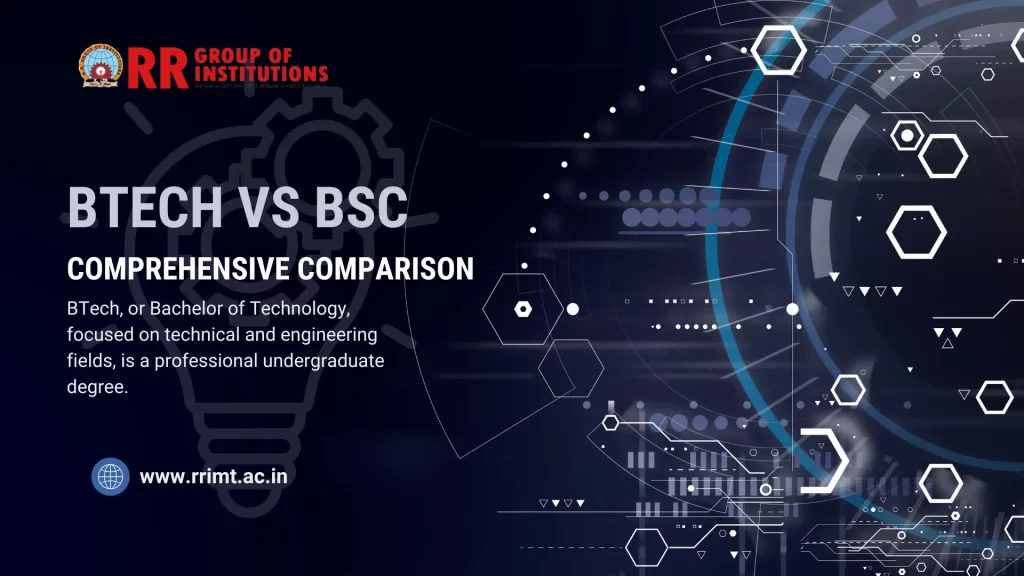
Overview of BTech vs BSc
Among the best options, BTech (Bachelor of Technology) vs BSc (Bachelor of Science) are two popular choices. But which one is better suited for your aspirations? This guide dives deep into the differences, advantages, and career prospects of these degrees to help you make an informed decision.
What is BTech?
BTech, or Bachelor of Technology, focused on technical and engineering fields, is a professional undergraduate degree. Emphasizing technical abilities, creativity, and practical applications, it prepares students for jobs particular to their field of study.
What is BSc?
Focusing on fundamental scientific ideas and theoretical understanding, the academic undergraduate degree BSc, or Bachelor of Science, supports research-oriented learning and offers a stage for specialization in several scientific disciplines.
Key Differences Between BTech and BSc
- Duration: normally lasting four years, BTech courses contrast with BSc programs, which normally run three years.
- Focus: While BSc stresses academic knowledge and research, BTech stresses technical and practical abilities.
- Curriculum: BTech offers industry-specific training, projects, and internships; BSc comprises more general subject-based theory and laboratory work.
- Career Orientation: While BSc graduates may pursue additional study or research, BTech graduates typically land directly in technical employment.
Career Opportunities
Career Options After BTech
- Software Developer
- Civil Engineer
- Mechanical Engineer
- Data Scientist
- IT Consultant
Career Options After BSc
- Research Scientist
- Data Analyst
- Lab Technician
- Environmental Consultant
- Teacher/Professor
Salary Comparison: BTech vs BSc
Because of the industry need for technical knowledge, BTech graduates typically start their careers with more money. Higher education or specialized degrees, however, can help BSc graduates get competitive pay.
Educational Scope
Specializations in BTech
- Computer Science Engineering
- Mechanical Engineering
- Civil Engineering
- Electronics and Communication Engineering
- Biotechnology
Specializations in BSc
- Physics
- Chemistry
- Mathematics
- Biology
- Environmental Science
Higher Education: BTech vs BSc
While BSc graduates tend towards MSc, PhD, or professional courses like BEd or MCA, BTech graduates generally seek MTech or MBA programs.
Eligibility and Admission
Eligibility Criteria for BTech
- Finishing ten plus two with mathematics, chemistry, and physics.
- Entrance tests, including state-level tests, JEE Main, and JEE Advanced.
Eligibility Criteria for BSc
- completion of 10+2 with pertinent subjects, usually with a scientific basis.
- Usually, admission is based on merit or tests particular to a university.
Admission Process: BTech vs BSc
Highly competitive BTech admissions call for entrance exam results and counseling. Usually driven by academic merit, BSc admissions are easy.
Advantages and Challenges
Advantages of Pursuing BTech
- Great market for engineers in industry.
- Practical technological instruction.
- Chances for internships and placements.
Advantages of Pursuing BSc
- Solid theoretical scientific basis.
- Research and higher education: flexibility
- Various professional routes in business and academics.
Challenges in BTech and BSc
- BTech: Expensive courses and hefty tuition costs.
- BSc: Not many quick employment prospects without more study.
Comparison by Industry
BTech vs BSc in IT and Computer Science
- Many of BTech grads work as IT specialists or software developers.
- Graduates of BSc shine in data analysis and theoretical research.
BTech vs BSc in Biotechnology
- Product development and industrial applications are BTech’s areas of concentration.
- BSc stresses fundamental knowledge and research skills.
BTech vs BSc in Physics and Chemistry
- Physics and chemistry are combined by BTech into engineering professions.
- For academics and research, BSc offers great depth of subject knowledge.
FAQs
Is BTech Better Than BSc?
Your job objectives will determine the option. For technical and engineering jobs, BTech is better; for those driven toward research and academia, BSc fits.
Who Should Choose BTech Over BSc?
BTech is something students interested in direct industry involvement and hands-on technological work should give thought to.
Can BSc graduates compete with BTech graduates?
Indeed, particularly in specialist domains and research. BSc graduates with further qualifications can match or surpass BTech colleagues in several sectors.
Conclusion: Which One to Choose?
Your interests, job goals, and long-term objectives will determine which of BTech vs BSc best fits you. For individuals looking for a technical job with direct industry impact, BTech is suitable; for those driven by science and research, BSc is ideal. To make a wise decision, think about your strengths, see academic advisers, and investigate future prospects.

